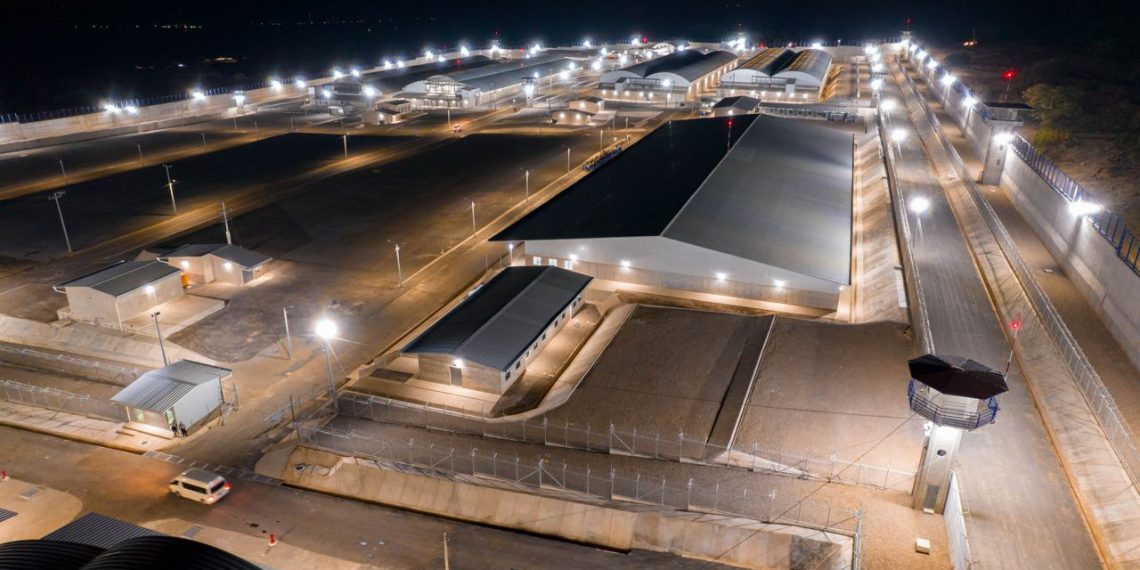Central America
Brazilian deputies visit Cecot and highlight security results

December 18 |
Brazilian federal deputy Eduardo Bolsonaro highlighted yesterday on social networks the security results obtained by the government of President Nayib Bukele. The Brazilian legislator was part of the delegation of seven parliamentarians who visited the country to see the Terrorism Confinement Center (Cecot) and all the security policies implemented in the last four years.
He also reiterated that President Bukele has a 90% approval rating from the population and that the security measures implemented with the Territorial Control Plan (PCT) and the exception regime have allowed El Salvador to accumulate more than 500 days without homicides during his administration, in which more than 75,000 criminals, mainly gang members, have also been arrested.
The implementation of security strategies, reforms to regulations so that criminals do not leave prisons, the alignment of powers and the dignification of the security forces are some of the aspects that Bolsonaro highlighted, so he reiterated that this has allowed President Bukele to achieve the transformation of El Salvador.
“What Nayib Bukele did is everything we proposed in terms of security in the Brazilian congress. The mentality is the same: arrested criminals do not commit crimes in society. With greater punishability, the economic theory of the criminal becomes more dangerous for him to commit a crime. Bukele managed to do this by electing a group of aligned parliamentarians and purging mainly the radical left in the elections,” Bolsonaro wrote in X.
The congressman stressed that, thanks to the exception regime, El Salvador went from being the most violent country in the world in 2015 to a benchmark in security and rivaling Switzerland for the number of homicides per 100,000 inhabitants.
“Today, if a police officer finds a notorious mafioso, he can arrest him for up to six months, the time the Public Prosecutor’s Office has to present the first evidence against the accused. The rule is that the accused responds to the arrested case (in Brazil it is the opposite). Between criminals and good people, today El Salvador cares about good citizens. That is why in Brazil there are criminals every day who have criminal records, who walk around the block and are arrested countless times; no longer in El Salvador,” he said.
President Bukele managed to decrease the criminal actions of gangs since he began his administration in 2019, and 2023 is about to close as the safest year in the history of El Salvador, an aspect that has paved the way for sectors such as the economy, tourism and education to develop and strengthen; to this effect the president considered important the dignification of law enforcement and has emphasized that none of the above would be possible without them.
Bolsonaro pointed out: “With more personnel, better salaries, with social security support, technology, support from the president and the population, as well as legal support, the police will fight the initial battle. Then comes social support: health, education, employment. Before, it made no sense to build schools in a gang-dominated area […]. Tourism also receives special attention as an economic engine.
Central America
Laura Fernández Says She Will ‘Never’ Allow Authoritarianism in Costa Rica

Costa Rica’s president-elect, right-wing leader Laura Fernández, said she will “never” allow authoritarianism under her government, in her first speech after winning Sunday’s presidential election.
Fernández, the political heir of outgoing President Rodrigo Chaves, has been accused by her opponents of seeking to steer the country toward authoritarian rule through her hardline proposals against drug trafficking and plans to reform state institutions.
“I, as the new president of the Republic, will never allow authoritarianism or arbitrariness—things that no one wants in Costa Rica,” Fernández said to cheers from her supporters gathered at a hotel in the capital.
The 39-year-old political scientist criticized her rivals for centering their campaign on what she described as a narrative of “authoritarianism and dictatorship.”
“They tried to scare voters, but the electorate did not fall into the trap,” she said.
Without offering details, Fernández acknowledged that her administration will seek to change the country’s “political rules of the game,” in what she described as a necessary step for Costa Rica, one of Latin America’s most stable democracies.
Central America
Costa Rica Goes to the Polls as Voters Choose Continuity or Change

Costa Ricans head to the polls today to elect the president of the republic and 57 members of the Legislative Assembly for the 2026–2030 term. Voters must choose between continuing the political project of outgoing President Rodrigo Chaves by supporting the ruling right-wing candidate Laura Fernández, or opting for a change in direction proposed by the opposition.
Fernández, representing the Pueblo Soberano Party (PPS), leads opinion polls with close to 40% of voting intention, bolstered by the outgoing president’s approval rating, which exceeds 50%. Chaves is barred from seeking immediate re-election under Costa Rican law.
Trailing far behind is Álvaro Ramos of the National Liberation Party (PLN), with less than 10% support. He is followed by Claudia Dobles of the Citizen Agenda Coalition (CAC), Fabricio Alvarado of New Republic (NR), and Ariel Robles of the Broad Front (FA), each polling between 3% and 5%. Undecided voters, who account for more than 30% of the electorate, could determine the outcome of the presidential race or force a runoff.
In a statement, Costa Rica’s Supreme Electoral Tribunal (TSE) reaffirmed its commitment to transparent and secure elections. “As has been the case for more than 76 years of democratic life in our country, the Supreme Electoral Tribunal guarantees all Costa Ricans that the national elections to be held this Sunday, February 1, will meet the highest standards of security and absolute transparency, allowing us to continue enjoying electoral processes in peace and freedom,” the institution said.
Authorities reported that 53,251 party observers will take part in the electoral process. Of these, 12,472 belong to the Social Christian Unity Party, 11,524 to Pueblo Soberano, 10,451 to the PLN, and 4,141 to the Citizen Agenda Coalition, among others. In addition, six political parties have sworn in 7,520 members of polling station boardsdeployed nationwide.
Central America
U.S. and Guatemala Sign Trade Deal Granting Zero Tariffs to Most Exports

The United States signed a reciprocal trade agreement with Guatemala on Friday, under which 70.4% of Guatemalan exports will enter the U.S. market tariff-free.
Guatemalan President Bernardo Arévalo highlighted the importance of the agreement, stating that it creates a framework of cooperation, certainty, and new opportunities for producers, workers, and entrepreneurs in the country. His remarks were shared in a video published on his official social media channels.
In 2025, 30.3% of Guatemala’s total exports were destined for the United States, amounting to approximately $4.3 billion. As a result, the agreement is expected to directly benefit key sectors of the Guatemalan economy, including agribusiness, manufacturing, and the textile industry.
“Today we have taken another step toward consolidating a country that, when it moves forward united, generates confidence, attracts investment, and creates real development opportunities for all its people,” Arévalo added.
The agreement with Guatemala follows a similar trade deal signed by the United States with El Salvador on Thursday, which includes the elimination of a 10% tariff on Salvadoran imports.
-

 International2 days ago
International2 days agoEpstein Denies Being ‘the Devil’ in Newly Released Video Interview
-

 International2 days ago
International2 days agoSpain Seeks to Ban Social Media Access for Children Under 16
-

 International2 days ago
International2 days agoMexico to Send Humanitarian Aid to Cuba Amid U.S. Threats Over Oil Shipments
-

 International2 days ago
International2 days agoPetro Resumes Extraditions, Sends Top Criminal to U.S. Before White House Talks
-

 International2 days ago
International2 days agoHypothermia Linked to Most Deaths During New York’s Recent Cold Spell
-

 International2 days ago
International2 days agoMexico Arrests Suspect in Shooting of Sinaloa Lawmakers
-

 International18 hours ago
International18 hours agoDelcy Rodríguez Takes Control of Chavismo as Venezuela Enters a U.S.-Supervised Transition
-

 Central America3 days ago
Central America3 days agoCosta Rica Goes to the Polls as Voters Choose Continuity or Change
-

 International18 hours ago
International18 hours agoHRW Warns Trump’s Influence Has Weakened Human Rights in Latin America
-

 Central America2 days ago
Central America2 days agoLaura Fernández Says She Will ‘Never’ Allow Authoritarianism in Costa Rica
-

 International2 days ago
International2 days agoNFL Investigating Emails Linking Giants Executive to Jeffrey Epstein










































































































